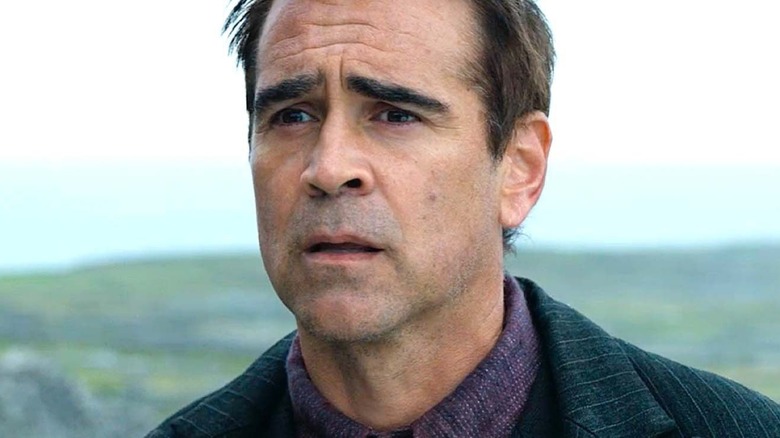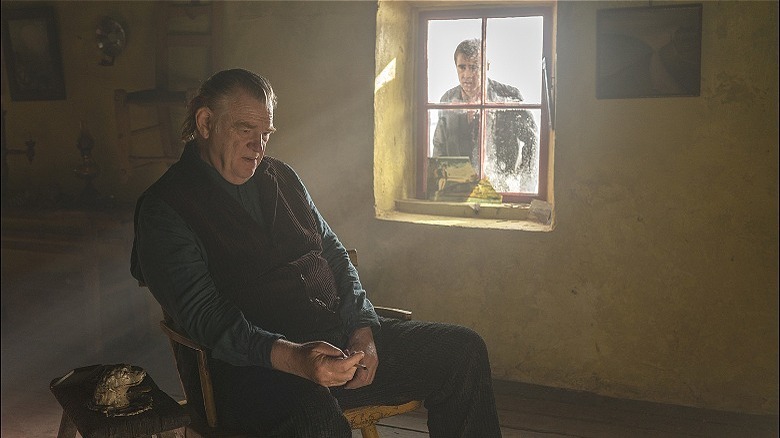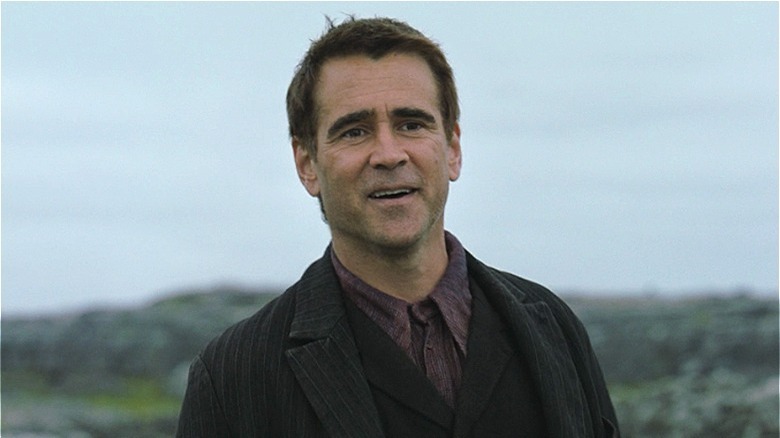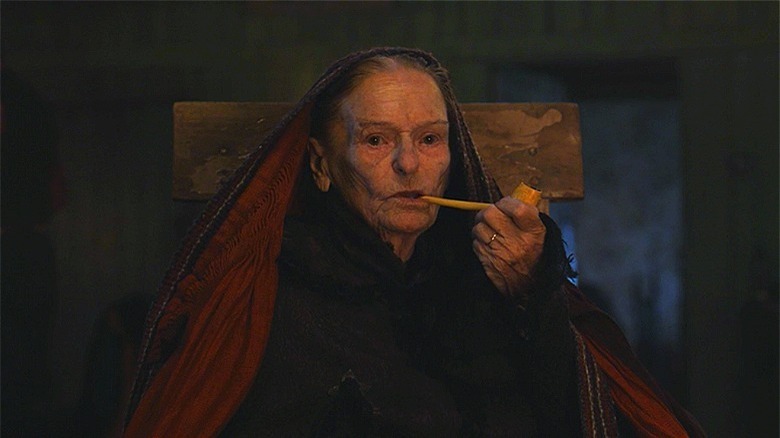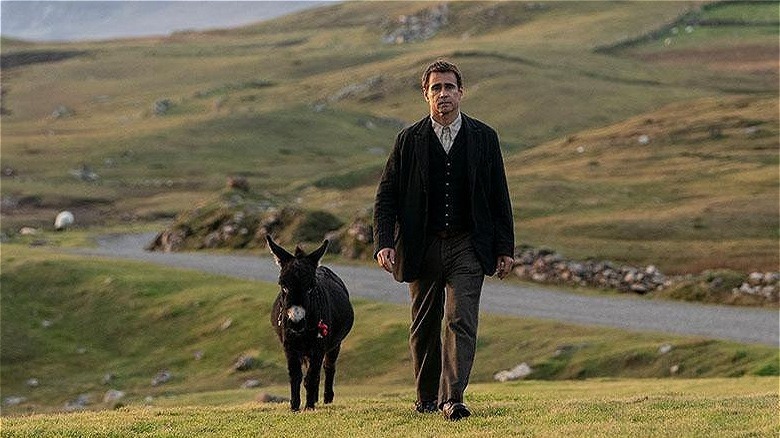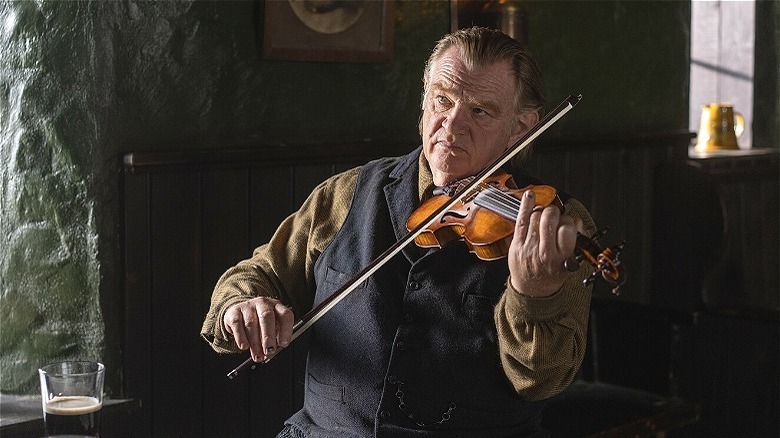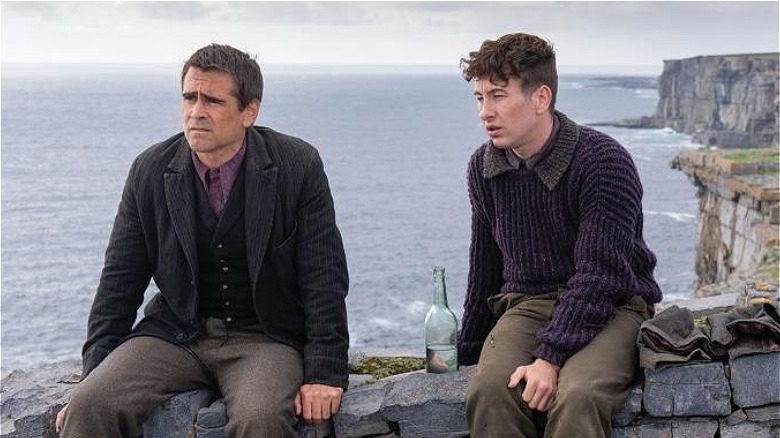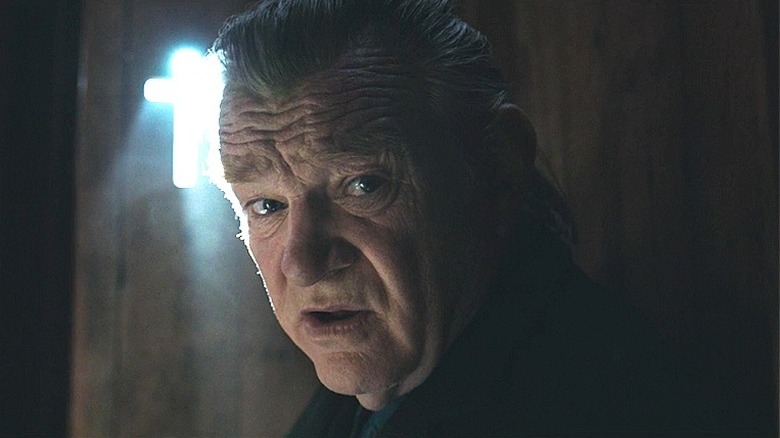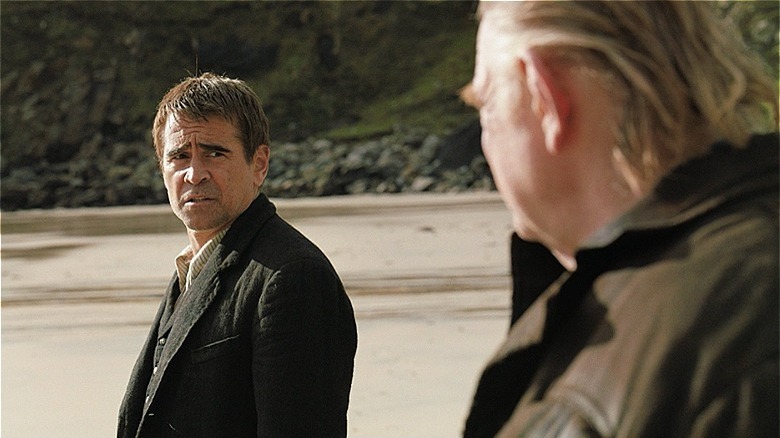The Ending Of The Banshees Of Inisherin Explained
"The Banshees of Inisherin," written and directed by Martin McDonagh, reunites Irish actors Colin Farrell and Brenden Gleeson, who previously starred together in McDonagh's 2008 black comedy "In Bruges." Farrell, Gleeson, and McDonagh all garnered awards attention for the film, a dark tragi-comedy that had viewers laughing out loud almost as much as they were gasping in horror.
On a little Irish island in the early 1920s, two men find themselves at perplexing odds. Padraic (Farrell) is at a loss when his closest friend, Colm (Gleeson), gives him the cold shoulder one day for no apparent reason. When Padraic asks Colm what he's done to upset him, Colm declares that he hasn't done anything — he just doesn't want to be friends with Padraic anymore. Disbelievingly, Padraic attempts to rekindle their friendship, but this results in a drastic response from Colm. In order to show Padraic how serious the matter is, Colm promises to cut off one of his own fingers every time Padraic speaks to him. Their feud escalates until nearly everyone on Inisherin is pulled into the fray, resulting in an unresolved dispute that satisfies no one.
The film is set against a lush, green Irish countryside, but that natural beauty is marred by the darkness and the heavy metaphor at the heart of "The Banshees of Inisherin." As for the movie's ending, there's a lot to unpack. So without further ado, grab yourself a pint, and let's get to explaining that bewildering conclusion.
The war at home
To really get at the heart of "The Banshees of Inisherin," we first need to have a bit of a history lesson (sorry, kids). In 1919, the Irish Republican Army fought for independence from Great Britain, resulting in the Irish Free State in the south. (Those who remember the 1996 historical drama "Michael Collins" might have a little bit of knowledge about these events.) However, the north of Ireland remained under British rule, even after a treaty was formed in 1921. Even the so-called Free State was still expected to show some allegiance to the British government. Because of this, some considered it never fully independent (via The Irish War).
The treaty caused a rift between members of the IRA and the citizens of the Free State, which turned into an all-out civil war in 1922. It was a bloody battle on both sides, as the pro-treaty Free States Army and the anti-treaty IRA shot each other down in violent guerrilla warfare. The civil war ended in 1923, when the Republican Army's numbers dwindled as the majority of them were either executed or imprisoned. In the end, there were no real winners in this conflict, and we still don't have an accurate number of deaths (per The Irish Times).
"The Banshees of Inisherin" takes place during the end of the Irish Civil War, and is a metaphor for the war itself. Like the feud between Colm and Padraic, the war was futile and caused nothing but suffering for everyone involved. Where once they were like brothers, the two men find themselves on opposing sides for reasons that don't quite make sense to either of them. In the end, only blood and ashes are left behind.
The importance of niceness
There are countless reasons why a friendship may end — dishonesty, disloyalty, jealousy, and just plain misunderstandings, to tick off a few. In "The Banshees of Inisherin," Colm's reasoning for breaking off his long-time friendship with Padraic is a baffling one. He tells Padraic's sister, Siobhan (Kerry Condon), that Padraic is just too "dull" to be friends with anymore.
Despite Colm's warning to Padraic not to speak to him, Padraic breaks the rule when he gets drunk at the pub and tells Colm off. In his rant, Padraic tells Colm that he used to be nice, but he's not anymore. Colm insists that niceness is forgotten and doesn't make history. Padraic disagrees, insisting that being nice does last, and that nice people are remembered. Though we agree with Padraic about niceness, the sad irony is that Padraic's own niceness doesn't last forever.
As he delves deeper into despair over losing his friend, his kind nature begins to deteriorate. One of Colm's music students from the mainland starts spending more time with Colm and inciting Padraic's jealousy. To get rid of him, Padraic lies about his father being in a serious accident. Then, at the height of his anger, Padraic sets fire to Colm's house while Colm is still inside. To be fair, he does warn Colm he's going to do it in advance, and takes care of Colm's dog afterward. Still, for all his talk of niceness, Padraic falls into the trap of bitterness and spite.
The banshee of Inisherin
The film's title, "The Banshees of Inisherin," comes from a song that Colm is composing on his violin. He tells Padraic that he came up with the name mostly because liked the "sh" sounds — which, incidentally, is also McDonagh's reasoning for the film's title (per Deadline). Of course, there's more to it than that. In Irish folklore, a banshee is a phantom that foretells death with her eerie shriek (via Britannica).
There is one resident of the island who matches Colm's description perfectly. That person is Mrs. McCormack (Sheila Flitton), a grim and downright creepy old woman who plays a symbolic role in the film. She visits Siobhan at their cottage despite the siblings' distaste for her, and in one scene Padraic tries to hide from Mrs. McCormack rather than pass her on the road. Of course, her keen eyes spot Padraic anyway, and she engages him in an unsettling conversation. She tells Padraic that death is coming, and two of Inisherin's residents will likely be victims. Her prediction later comes true when troubled young Dominic (Barry Keoghan) is found drowned, and Padraic's beloved pet donkey Jenny dies from choking on Colm's dismembered finger.
Mrs. McCormack can be seen in the background of a few scenes in "The Banshees of Inisherin," often watching as tragic events unfold. Like the mythical banshee, she is an unwelcome harbinger of death, although she prefers skulking in the shadows to wailing on the moors. Nonetheless, Mrs. McCormack plays an important role in the film, reminding viewers that death is always present — watching and waiting.
Padraic's loneliness
Colin Farrell's acting career has been as versatile as they come. He's been an action star, a romantic hero, a villain, and much more, and has excelled in each role. As Padraic, Farrell takes on a character who is, at heart, a simple man with simple wants. He has no ambitions other than living a quiet, happy life among friends and family. When that peaceful life is turned upside down, Padraic's gentle nature is stripped away, revealing a fragile man gripped by isolation and self-loathing.
Besides Colm, Padraic's only close confidante is his sister, Siobhan. The two have lived together for all of their adult lives, so when Siobhan tells Padraic that she has accepted a job on the mainland and will be leaving Inisherin, Padraic begs her not to go. His only other source of companionship is the farm animals that live with them, including Padraic's favorite, a donkey named Jenny. Sadly, Jenny dies suddenly when she tries to eat one of Colm's dismembered fingers and chokes. The loss of his beloved pet is felt keenly by Padraic, who buries her with particular love and care. Jenny's death is also the catalyst for Padraic retaliating against Colm by setting Colm's cottage on fire with him inside.
In an earlier scene in the film, Siobhan asks Padraic if he ever gets lonely. Padraic shrugs off the question without answering, as though the very idea isn't even worth considering. By the end of "The Banshees of Inisherin," Padraic is well and truly alone. The sad truth is that he never realized just how lonely he really is until everyone he cares about is gone.
Colm's need for legacy
Colm is known on Inisherin for his musical talent. He plays the violin with a group of musicians at the local pub, and even composes his own pieces. His gift is so respected that even music students from the mainland come to Inisherin to learn from him. Music is Colm's passion and his livelihood, which makes his actions in response to Padraic's attempts to rekindle their friendship all the more shocking.
When Padraic goes on a drunken rant at the pub about niceness, Colm responds that niceness doesn't matter -– only legacy matters. He cites Mozart as an example, noting that his music has endured for hundreds of years. For Colm, being remembered throughout history is more important than anything. His dream is to write music that lasts, and he believes that being friends with Padraic will deter him from his goal. He's so determined to keep Padraic away from him that he cuts off the fingers of his dominant hand and throws them at Padraic's front door when Padraic refuses to leave Colm alone.
Colm's self-mutilation takes the idea of a tortured artist a bit too far. It does nothing to fulfill his musical legacy, as it renders him unable to play the violin he loves so well. It doesn't even help to keep Padraic away from him, which was the entire reason he made the threat. It's ironic that for all his talk of legacy, Colm ends up unable to live the dream that made him shun Padraic in the first place, and now has no legacy to leave behind.
Casualties of war
Every war has its share of collateral damage, and the one between Padraic and Colm in "The Banshees of Inisherin" is no exception. One of those caught in the middle is Siobhan. Siobhan attemps to intercede on her brother's behalf on multiple occasions, including confronting Colm at the pub, and running to stop Padraic from causing a drunken row. Since she and Padraic live together, she's with him at the cottage when Colm throws his finger at their front door. Although the feud is between her brother and Colm, Siobhan is the one stuck dealing with the worst parts of it. In the end, Siobhan decides to leave Inisherin behind and start a new life on the mainland, even though it means breaking Padraic's heart.
Another victim in the crossfire is Dominic, a troubled youth who lives with his abusive father. Having no real friends, Dominic tries to insert himself into Padraic and Siobhan's lives. When Padraic takes Dominic under his wing after witnessing the boy's abuse from his father, Dominic is eager for any sort of kindness. As the fight between Colm and Padraic worsens and Padraic's generous spirit wanes, the pedestal on which Dominic has placed Padraic is shaken, and Dominic's view of his former hero is shattered. Dominic's tragic fate, predicted by Mrs. McCormick, comes true when he drowns himself in the lake.
The film is clear in its metaphor that war affects everyone around it, and not just the two opposing sides. Everyone is hurt by the conflict — even poor Jenny, who was just feeling peckish.
Colm's despair
Colm's insistence on cutting off his own fingers is perplexing, especially for being such a talented musician who claims to love music so well. Even Van Gogh didn't sacrifice his own hands, the tools of his art, in his darkest moments. So what on Earth could have motivated Colm to take such drastic measures, just to prove a point to Padraic?
After Colm gives Padraic the cold shoulder, Padraic confides in Siobhan that he thinks Colm might be depressed, which would explain his bizarre behavior. Shortly after, Colm goes to confession, and the priest asks Colm about his feelings of despair. It's implied that Colm has spoken to the priest before about problems with his mental health. Colm tells the Father that he's feeling better lately -– possibly because he's broken ties with Padraic, but he doesn't say for certain.
Depression is a serious mental illness that can cause one to be hounded by feelings of self-doubt. Self-harm is just one possible symptom. Colm absolutely could be suffering from depression, which would explain why he chooses to isolate himself from one of his closest friends and inflict physical harm on himself. It may be that Colm feels too much pressure to leave behind a great musical legacy, thus committing self-sabotage by cutting off his own fingers. Regardless of the reasoning, Colm's declining mental health is a huge factor in the tragedy of the film.
If you or someone you know needs help with mental health, please contact the Crisis Text Line by texting HOME to 741741, call the National Alliance on Mental Illness helpline at 1-800-950-NAMI (6264), or visit the National Institute of Mental Health website.
Last two men standing
The final scene of "The Banshees of Inisherin" is quietly tragic, as Colm and Padraic stand on the shore and have one last conservation. At this point, both men are well and truly broken. Padraic has lost everyone he's ever loved, and Colm has lost his home, his fingers, and his ability to make music. Colm makes a comment that since Padraic has burned down his house, their war must be over. Padraic replies that if Colm had stayed inside his house, only then would it be over.
Even with everything that has transpired between them, Padraic and Colm still can't resolve their issues. And really, how could they? They're both surrounded by the literal ashes of the destruction they've caused, and nothing can bring back what they've lost. Any foundation that might have been rebuilt has been destroyed, with no chance of ever again finding purchase. Yet the ones at the center of the conflict are still left standing, forced to come to terms with the aftermath.
The severed relationship between Colm and Padraic at the end of the movie is much like the end of the Irish Civil War. Even today, there is tension between Northern Ireland and the Republic of Ireland, and the two countries continued to be in conflict in the decades that followed the war (per History). Fans of the series "Derry Girls" will recall that even as recently as the 1990s, the two countries were at odds in a time known as the Troubles. The ending of the film symbolizes the tensions between Ireland's north and south, represented by Colm and Padraic, and how sad it is when two sides come to be at odds with one another.
